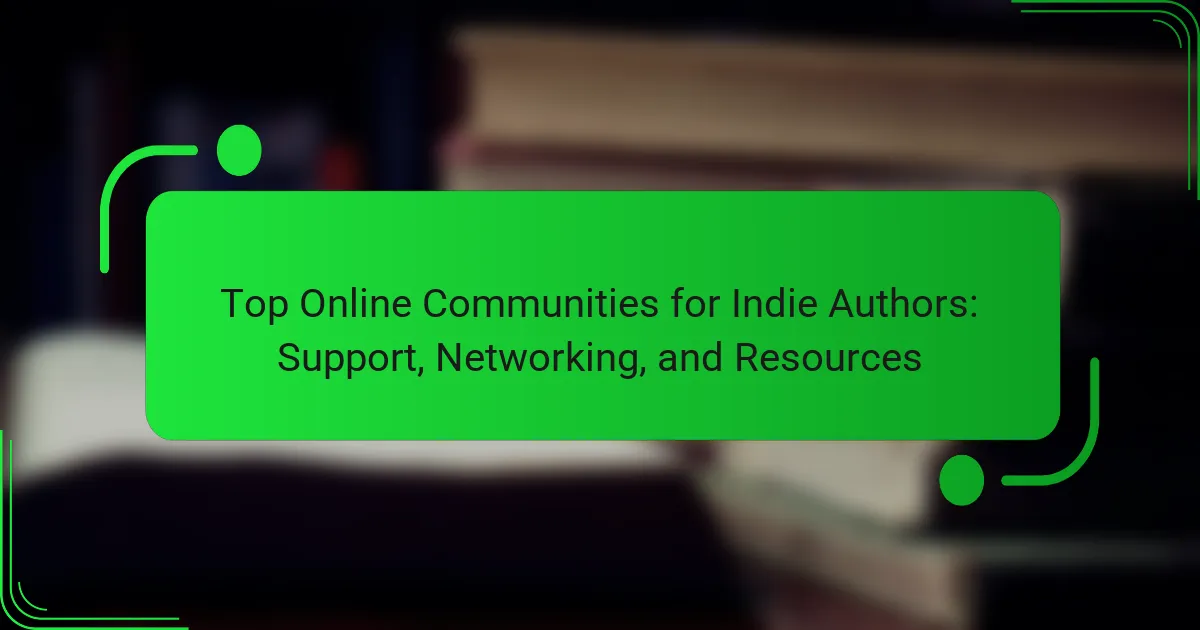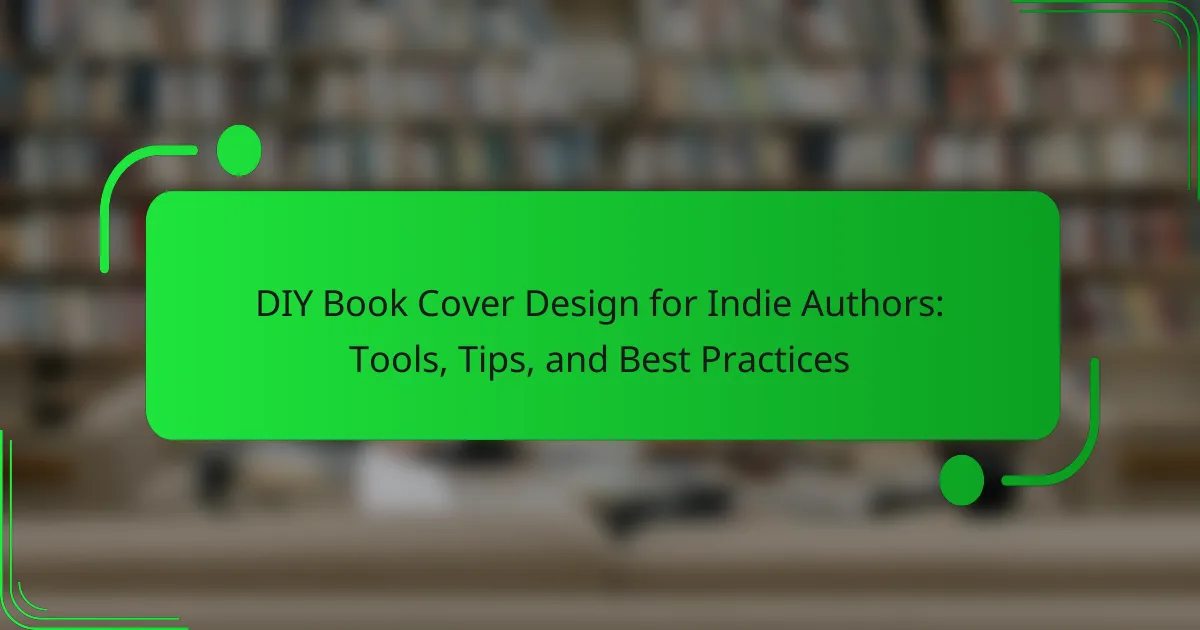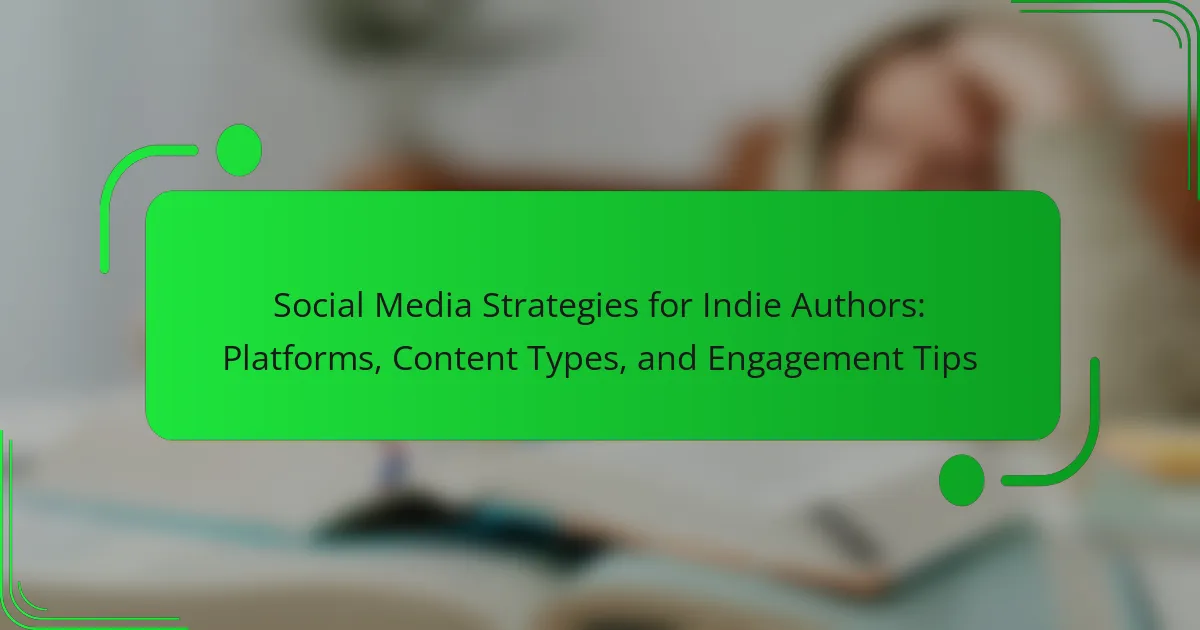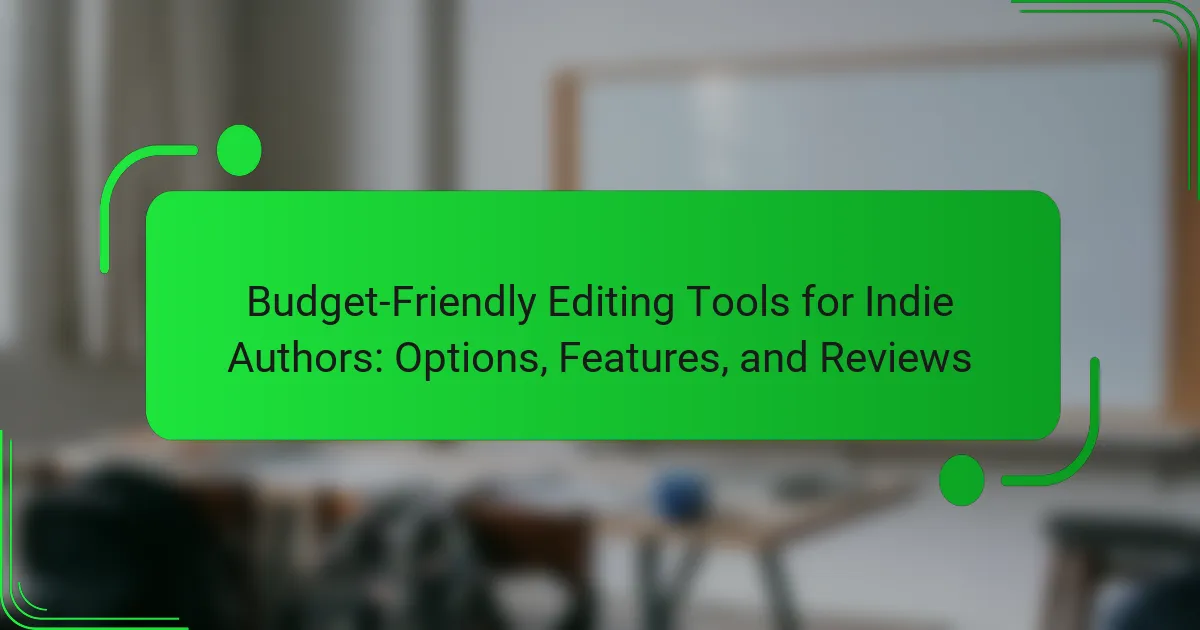Indie authors often struggle with limited budgets, marketing expertise, and time constraints. Effective strategies include leveraging social media, email newsletters, and author websites for direct reader engagement. Data analytics can optimize marketing efforts, while successful case studies highlight innovative promotional techniques. Focusing on personalized marketing and community building is essential for visibility and sales growth.
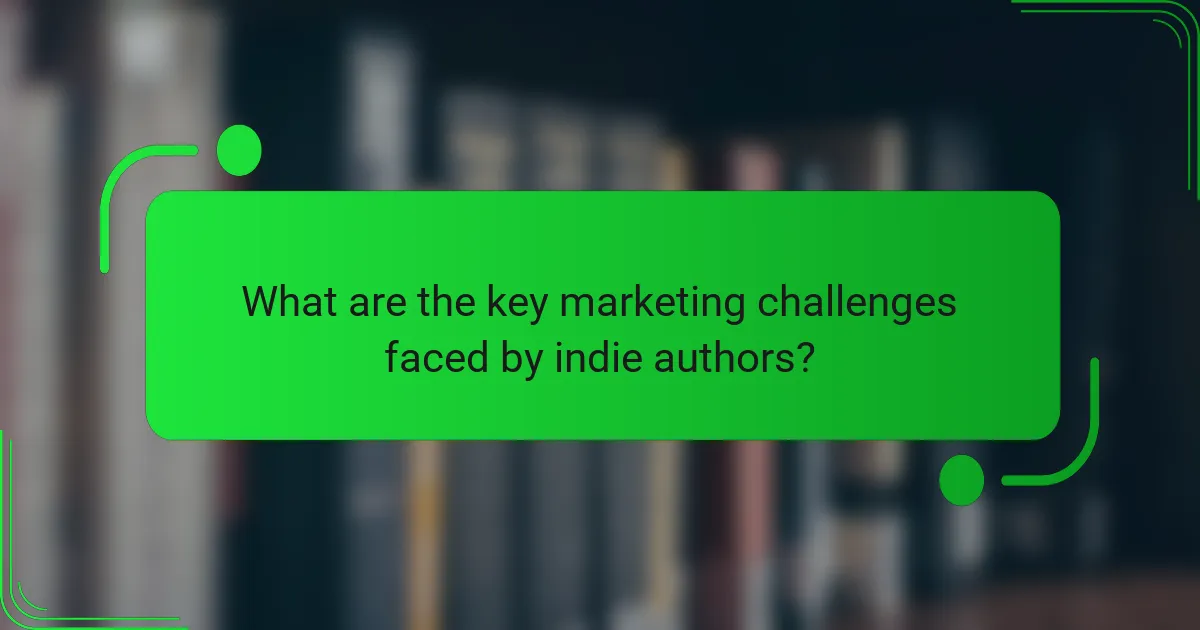
What are the key marketing challenges faced by indie authors?
Indie authors face several key marketing challenges that can hinder their success. Limited budgets restrict access to professional marketing services and tools. Building a recognizable brand is difficult in a crowded market, making it hard to stand out. Additionally, indie authors often lack marketing expertise, which can lead to ineffective strategies. Finally, time constraints limit their ability to engage with audiences consistently and develop effective promotional campaigns.
How does audience targeting impact marketing success?
Audience targeting significantly enhances marketing success by ensuring messages reach the right readers. By identifying specific demographics, indie authors can tailor their content and promotional strategies effectively. This focused approach increases engagement and conversion rates, resulting in higher sales and audience loyalty. Targeting also allows authors to utilize platforms that align with their audience’s preferences, maximizing their marketing efforts. For instance, using social media channels popular among their target demographic can lead to more effective outreach.
What budget considerations should indie authors keep in mind?
Indie authors should prioritize budget for marketing, editing, and design. Allocate funds for social media ads, website development, and promotional materials. Consider costs for book launch events and ongoing marketing efforts. Track expenses to optimize future investments.
Why is building an author brand essential for indie authors?
Building an author brand is essential for indie authors because it establishes recognition, fosters reader loyalty, and enhances marketing effectiveness. A strong brand differentiates authors in a crowded market, making it easier for readers to connect with their work. Consistent branding across platforms builds trust and encourages engagement, leading to increased book sales and opportunities for collaboration. Additionally, a well-defined author brand can streamline marketing strategies, allowing indie authors to target their audience more effectively.
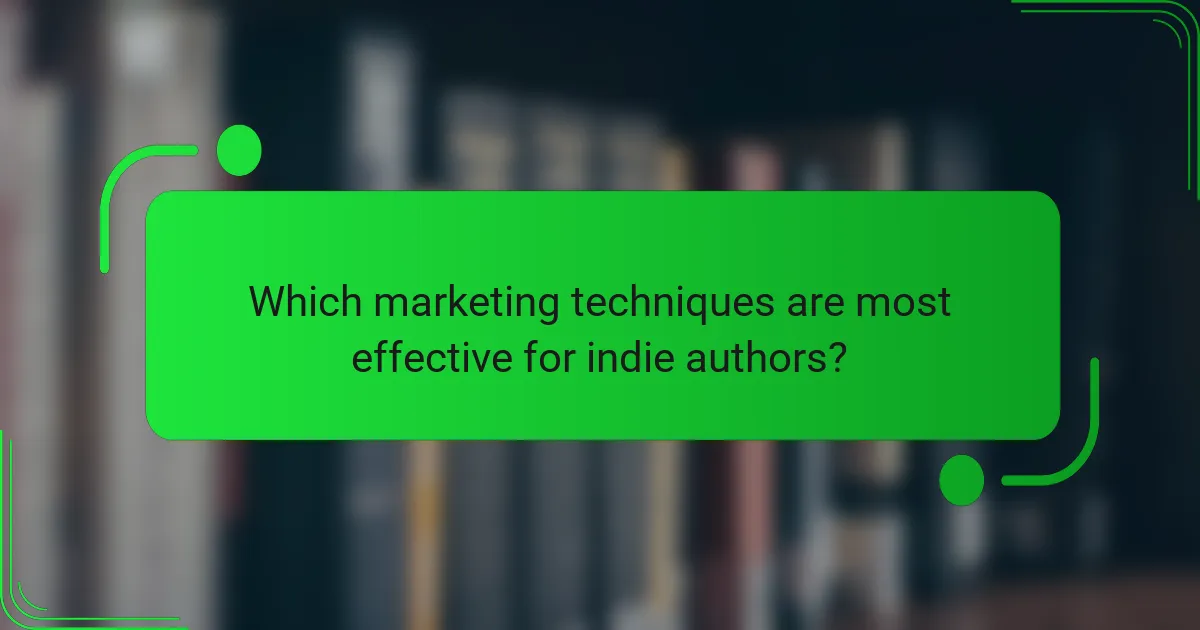
Which marketing techniques are most effective for indie authors?
Indie authors can effectively market their work using social media, email newsletters, and author websites. Social media platforms like Instagram and Twitter enable direct engagement with readers. Email newsletters allow for personalized communication and updates on new releases. An author website serves as a central hub for information and sales. These techniques foster community, increase visibility, and drive sales.
How can social media platforms enhance visibility?
Social media platforms enhance visibility by providing indie authors with a direct channel to engage with readers. They allow authors to showcase their work, share insights, and build a community. Platforms like Instagram and Twitter facilitate real-time interactions, increasing audience reach. Utilizing targeted ads can further amplify visibility, reaching specific demographics interested in the author’s genre. Engaging content, such as behind-the-scenes looks or reader polls, can foster loyalty and encourage word-of-mouth promotion.
What role does content marketing play in author promotion?
Content marketing is essential for author promotion as it builds visibility and engages readers. Effective strategies include creating valuable content, utilizing social media platforms, and leveraging email newsletters. Authors can showcase their expertise through blogs, podcasts, or videos, establishing a connection with their audience. Case studies reveal that consistent content marketing increases book sales and fosters a loyal reader base.
How do email marketing campaigns benefit indie authors?
Email marketing campaigns provide indie authors with direct access to their audience, fostering engagement and loyalty. These campaigns enable authors to share updates, promotions, and new releases effectively. By segmenting their audience, authors can tailor messages, increasing open and click-through rates. This targeted approach enhances the likelihood of book sales and reader retention. Moreover, email marketing offers measurable results, allowing authors to refine their strategies based on performance data. Ultimately, these campaigns can significantly boost an indie author’s visibility and revenue.
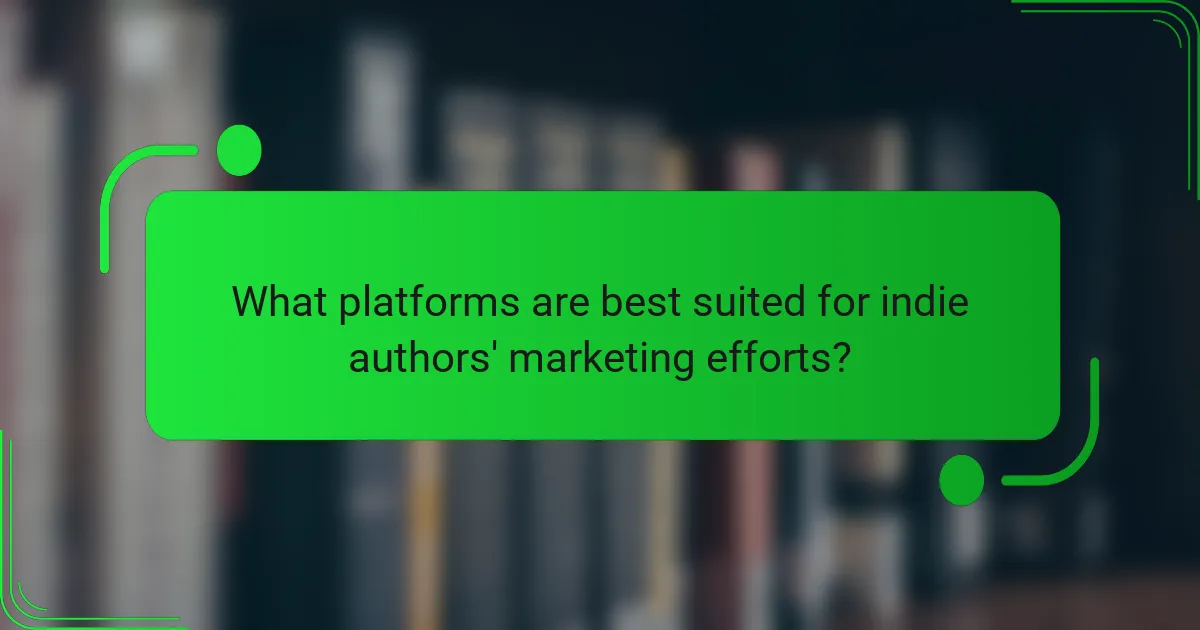
What platforms are best suited for indie authors’ marketing efforts?
Social media platforms, email marketing, and author websites are best for indie authors’ marketing efforts. These platforms enable direct engagement with readers and effective promotion of books.
Social media, such as Facebook and Instagram, allows authors to build a community and share content. Email marketing helps maintain reader relationships and promote new releases. An author website serves as a central hub for information, sales, and branding.
Utilizing these platforms strategically can enhance visibility and drive sales for indie authors.
Which social media platforms yield the highest engagement rates?
Instagram, Facebook, and TikTok yield the highest engagement rates among social media platforms. Instagram leads with an engagement rate of 1.22%, followed closely by Facebook at 0.08% and TikTok at 5.96%. These platforms are crucial for indie authors to connect with their audience effectively. Engaging visuals and videos on Instagram and TikTok drive user interaction, while Facebook’s community features foster discussions.
How does Amazon’s marketing ecosystem support indie authors?
Amazon’s marketing ecosystem provides indie authors with tools and resources to effectively reach their audience. Through Kindle Direct Publishing, authors can publish eBooks and paperbacks, gaining access to Amazon’s vast customer base. The platform offers promotional tools like Kindle Countdown Deals and Free Book Promotions, enhancing visibility and sales. Additionally, Amazon Advertising allows targeted ads, helping authors reach specific demographics. Success stories of indie authors show significant sales growth through these strategies, demonstrating the ecosystem’s effectiveness.
What are the advantages of using independent publishing platforms?
Using independent publishing platforms offers several advantages for authors. They provide greater control over content, allowing authors to maintain creative freedom. Independent platforms often have lower costs compared to traditional publishing, which can increase potential profits. These platforms also facilitate direct engagement with readers, fostering a loyal audience. Additionally, authors can leverage various marketing tools available on these platforms to enhance visibility and reach.
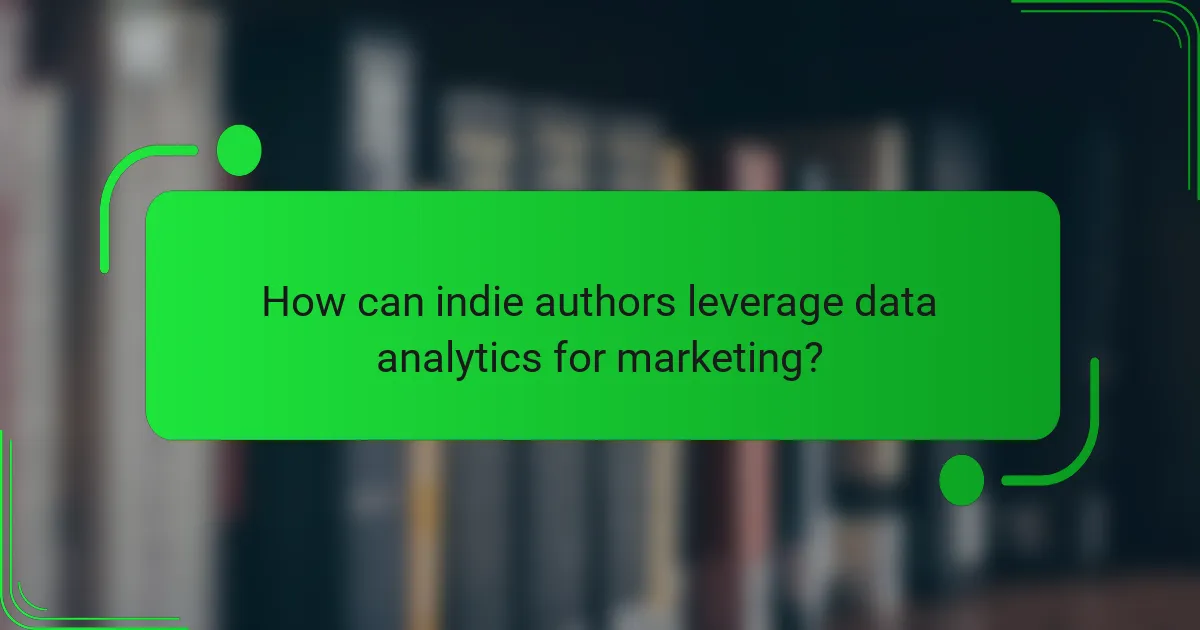
How can indie authors leverage data analytics for marketing?
Indie authors can leverage data analytics for marketing by utilizing insights to target audiences effectively. Data analytics helps identify reader preferences, optimize pricing strategies, and enhance promotional efforts. For instance, analyzing sales data can reveal peak purchase times, allowing authors to schedule marketing campaigns accordingly. Additionally, tracking social media engagement metrics can inform content strategies that resonate with potential readers. By applying these insights, indie authors can create tailored marketing strategies that increase visibility and drive sales.
What metrics should authors track to measure success?
Authors should track metrics such as sales figures, audience engagement, and social media reach to measure success. Monitoring these metrics provides insights into the effectiveness of marketing strategies.
| Metric | Description | Importance |
|————————–|———————————————-|——————————–|
| Sales Figures | Total units sold over a specific period | Indicates financial success |
| Audience Engagement | Likes, shares, comments on social platforms | Reflects reader interest |
| Conversion Rates | Percentage of readers who buy after visiting | Measures marketing effectiveness |
| Email Open Rates | Percentage of opened emails | Assesses email campaign success |
| Website Traffic | Number of visitors to the author’s website | Gauges overall visibility |
| Reviews and Ratings | Feedback on platforms like Amazon | Influences potential buyers |
How can A/B testing improve marketing strategies?
A/B testing enhances marketing strategies by allowing indie authors to compare different approaches and determine which resonates best with their audience. This data-driven method leads to improved engagement and conversion rates. For instance, testing different cover designs or promotional messages can reveal the most effective options. As a result, authors can refine their strategies based on real feedback, optimizing their marketing efforts for better results.
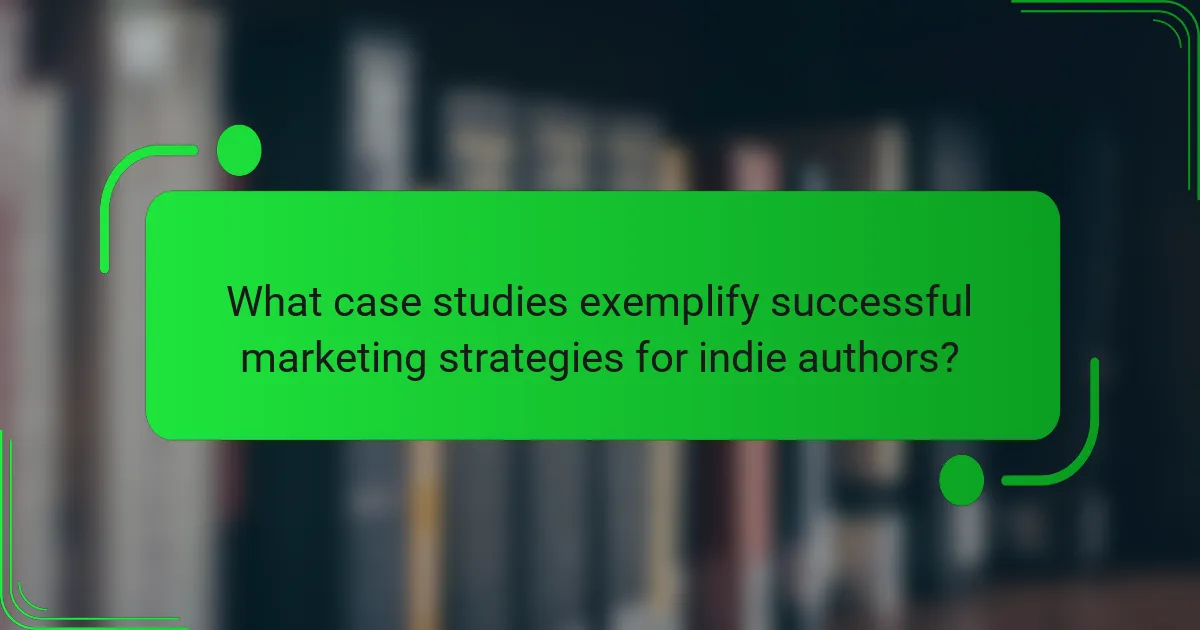
What case studies exemplify successful marketing strategies for indie authors?
Case studies showcasing successful marketing strategies for indie authors include various techniques that effectively boost visibility and sales. One example is the use of social media platforms, where authors like Amanda Hocking leveraged Facebook and Twitter to build a loyal readership. Another case is Hugh Howey, who utilized Kindle Direct Publishing and focused on reader engagement through newsletters, resulting in significant book sales. Additionally, indie authors often collaborate with book bloggers for reviews, enhancing their reach. These strategies emphasize the importance of direct audience connection and innovative promotional methods.
Which authors have effectively used social media for growth?
Authors like Amanda Hocking and Hugh Howey have effectively utilized social media to grow their readership. They engage with fans, share insights, and promote their work through platforms like Twitter and Facebook. Hocking’s success story includes leveraging her online presence to sell thousands of books independently. Howey gained traction by sharing serialized content on social media, which built anticipation and a loyal following. These strategies demonstrate the power of social media in indie author marketing.
How did specific marketing campaigns lead to increased sales?
Specific marketing campaigns have significantly increased sales for indie authors by utilizing targeted strategies. For example, social media advertising and email marketing have proven effective in reaching niche audiences. Case studies show that authors who engaged with readers through personalized content saw up to a 40% increase in sales. Additionally, leveraging platforms like BookBub and Goodreads allowed authors to enhance visibility and attract new readers. These campaigns often focus on unique attributes of the books, such as genre-specific themes or limited-time offers, which create urgency and drive purchases.
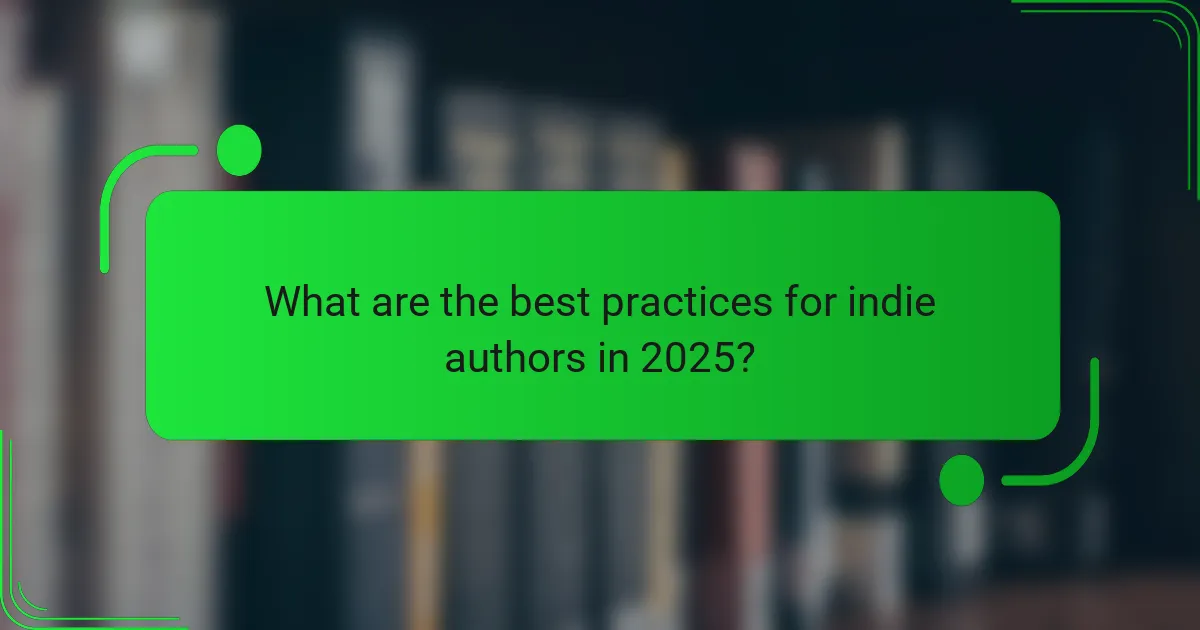
What are the best practices for indie authors in 2025?
Indie authors in 2025 should focus on personalized marketing, leveraging social media, and engaging with their audience. These practices enhance visibility and foster community.
1. Utilize targeted social media ads to reach specific demographics.
2. Create a newsletter to share updates and exclusive content.
3. Collaborate with influencers to tap into new audiences.
4. Host virtual events or webinars to connect with readers.
5. Invest in professional cover design and formatting for credibility.
6. Analyze data from marketing campaigns to refine strategies.
What common mistakes should indie authors avoid in their marketing efforts?
Indie authors should avoid common marketing mistakes like neglecting audience research, failing to build an author platform, and underestimating the power of social media engagement. These errors can hinder visibility and book sales.
1. Not identifying target readers limits effective marketing.
2. Skipping an author website reduces professional presence.
3. Ignoring social media platforms misses engagement opportunities.
4. Overlooking email marketing neglects direct communication.
5. Focusing solely on one marketing channel restricts reach.
6. Underestimating the importance of networking can isolate authors.
How can indie authors optimize their marketing strategies for maximum impact?
Indie authors can optimize their marketing strategies by leveraging social media, email marketing, and targeted advertising. Focus on building a strong online presence through engaging content and community interaction. Utilize platforms like Facebook, Instagram, and Goodreads to connect with readers. Case studies show that authors who regularly interact with their audience see higher engagement and book sales. Additionally, consider using data analytics to refine your approach and measure the effectiveness of different strategies.
